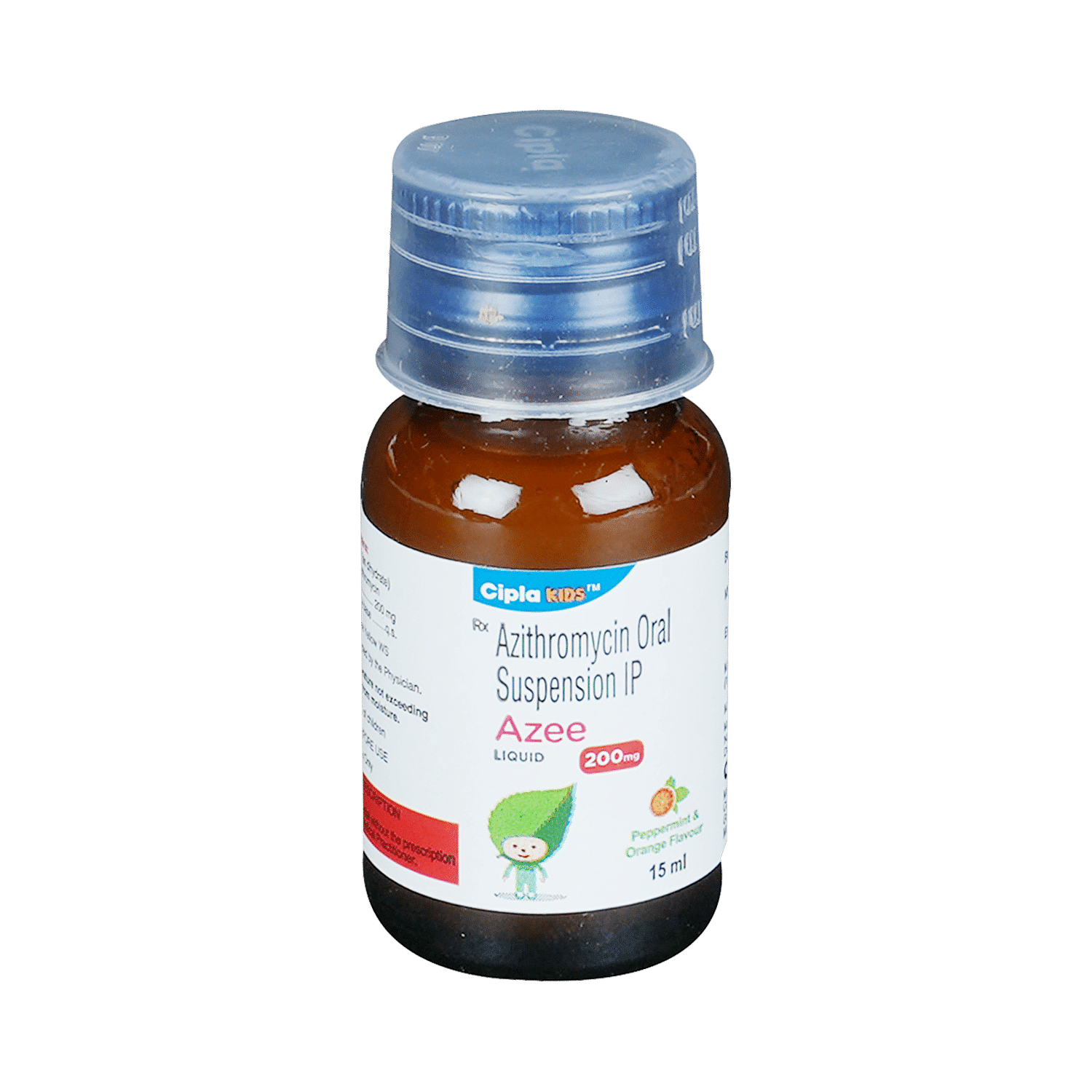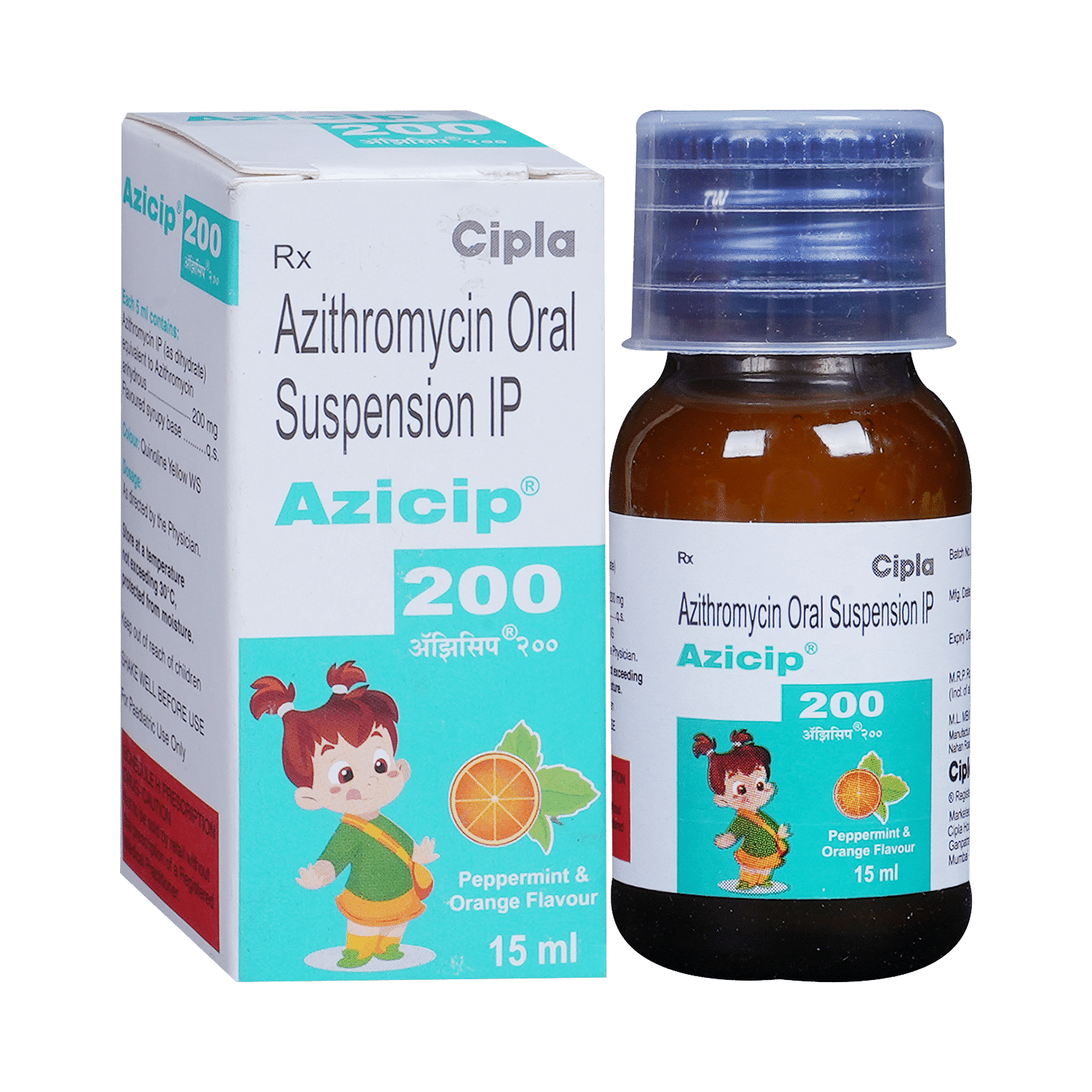
Azitrim 200mg Oral Suspension
Manufacturer
Bioxtreme Pharma
Salt Composition
Azithromycin (200mg)
Key Information
Short Description
Azitrim 200mg Oral Suspension is an antibiotic medication used to treat a wide range of bacterial infections in children.
Dosage Form
Oral Suspension
Introduction
Azitrim 200mg Oral Suspension is an antibiotic medication commonly given to children for the treatment of bacterial infections targeting the ear, eyes, nose, throat, lungs, skin, and gastrointestinal tract. It is essential to complete the entire course of this medicine to avoid the bacteria multiplying again, becoming resistant, or causing another infection.
Directions for Use
Give Azitrim 200mg Oral Suspension with food to avoid an upset stomach. Encourage your child to drink plenty of water in case diarrhea develops as a side effect.
How it works
Azitrim 200mg Oral Suspension is an antibiotic that works by interfering with the synthesis of essential proteins required by bacteria to perform important functions. It stops the infection-causing bacteria from growing further and prevents the infection from spreading.
Quick Tips
Complete the entire course of this medicine Give Azitrim 200mg Oral Suspension with food Encourage your child to drink plenty of water in case diarrhea develops Only give Azitrim 200mg Oral Suspension to your child for their current infection Stop the medicine and contact the doctor immediately if your child develops an itchy rash, facial swelling, and breathing difficulties soon after the intake
Related Medicines

Azee 200mg Liquid Peppermint & Orange

Azetop 200mg Oral Suspension

Azeemed 200mg Oral Suspension

Atnozith 200mg Oral Suspension

Azikia 200 Oral Suspension

Azicip 200mg Oral Suspension

Azit 200mg Oral Suspension

Triz 200mg Oral Suspension

Azelex 200mg Oral Suspension

Azikind XL 200mg Oral Suspension
Frequently asked questions
What if I give too much of Azitrim 200mg Oral Suspension by mistake?
Giving more than the recommended dose of Azitrim 200mg Oral Suspension is unlikely to cause significant harm, but seeking medical advice is crucial. If you believe your child has taken a larger amount than prescribed, please contact their healthcare professional immediately. They can provide guidance and ensure your child receives appropriate care.
Are there any possible serious side effects of Azitrim 200mg Oral Suspension?
While generally well-tolerated, Azitrim 200mg Oral Suspension may cause various side effects in some individuals. These can include severe stomach upset, kidney problems, allergic reactions, diarrhea, and more serious gastrointestinal infections. It's important to report any unusual symptoms to your child’s doctor for proper evaluation and management.
Can other medicines be given at the same time as Azitrim 200mg Oral Suspension?
Combining Azitrim 200mg Oral Suspension with other medications or substances can potentially lead to interactions. Before starting Azitrim 200mg Oral Suspension, consult with your child’s doctor or pharmacist to understand potential drug interactions and ensure safe medication use.
Can I get my child vaccinated while on treatment with Azitrim 200mg Oral Suspension?
Generally, it's safe to vaccinate children after the completion of antibiotic therapy for most infections. However, some instances may require waiting until they recover from the illness before getting vaccinated. Consulting your child’s doctor is crucial for guidance and addressing any specific concerns.
Which all lab tests should my child undergo while taking Azitrim 200mg Oral Suspension on a long term basis?
Regular monitoring of kidney function through blood tests or urine analysis might be necessary during prolonged treatment. It’s vital to follow your doctor's instructions for any laboratory testing.
Can Azitrim 200mg Oral Suspension impact my child’s digestion?
Azitrim 200mg Oral Suspension, like other medications, can sometimes cause digestive upset in children. The good bacteria in their gut may be affected by the antibiotic itself. If your child experiences diarrhea while on this medication, don't stop the course without consulting a doctor. They will advise on necessary adjustments to dosage or treatment.
Why is Azitrim 200mg Oral Suspension given for 3 days?
The duration of treatment depends on the specific condition and patient’s age. The prescribed dosage may vary based on the severity of the infection. Follow your doctor's guidance regarding the duration of treatment.
What should I avoid while taking Azitrim 200mg Oral Suspension?
Azitrim 200mg Oral Suspension can interact with certain antacids, impacting its effectiveness. It’s also important to protect your child from excessive sun exposure due to increased vulnerability to sunburn.
Is Azitrim 200mg Oral Suspension a strong antibiotic?
Azitrim 200mg Oral Suspension is considered an effective antibiotic for treating various bacterial infections. Its longer half-life (which indicates it stays in the body longer) makes it convenient for daily administration, often with only one dose per day.
Can you get a yeast infection from taking Azitrim 200mg Oral Suspension?
Taking Azitrim 200mg Oral Suspension might temporarily alter the balance of bacteria in the gut, potentially increasing the risk of yeast infections (thrush). If experiencing any unusual symptoms like a sore or vaginal itch, discharge, white patches in the mouth or tongue, it’s crucial to contact your doctor for proper evaluation and management.


